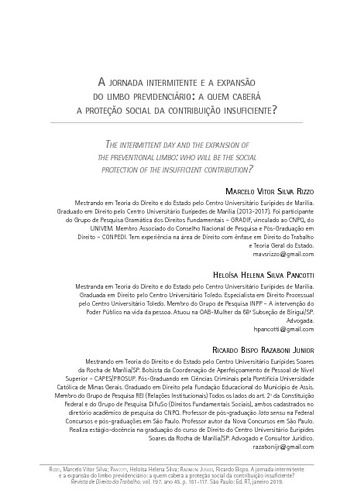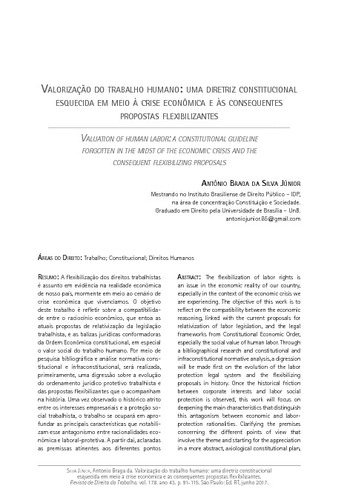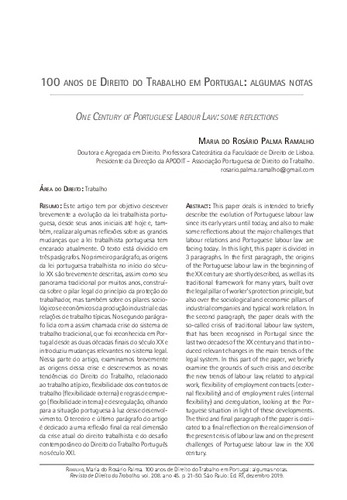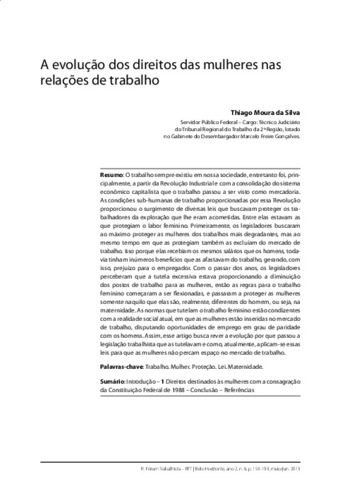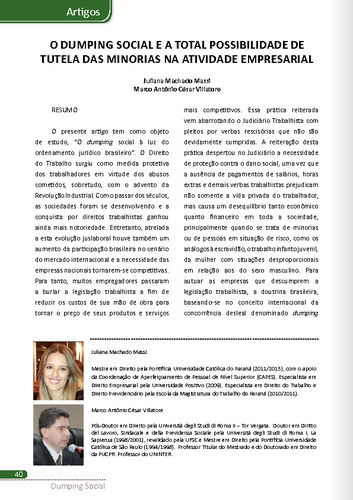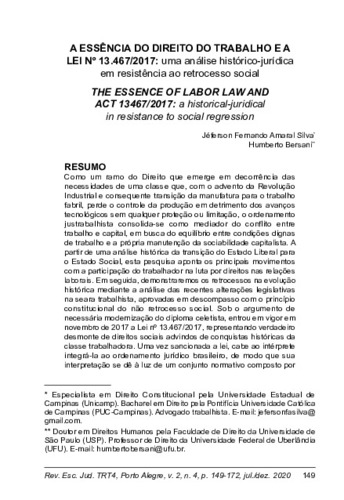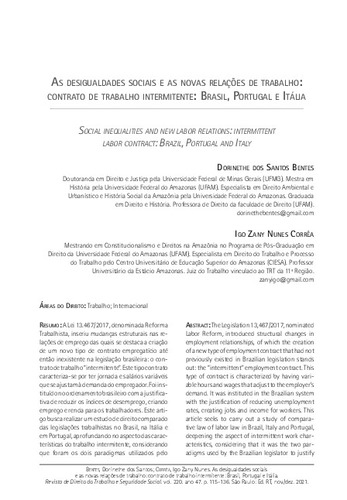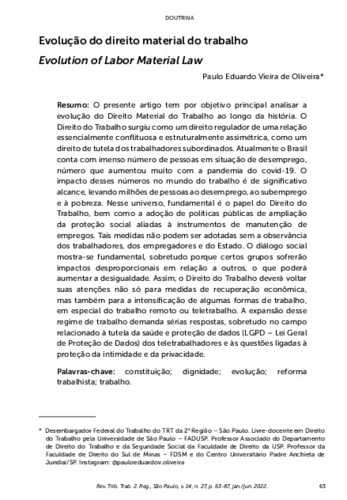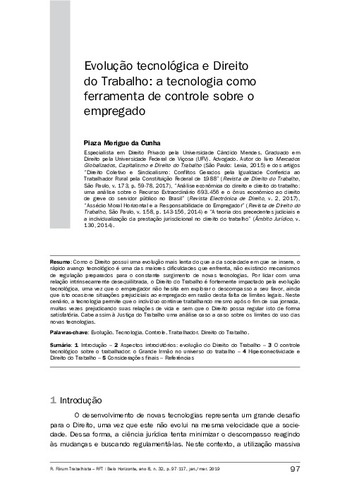Artigo de periódico
A jornada intermitente e a expansão do limbo previdenciário: a quem caberá a proteção social da contribuição insuficiente?
| dc.contributor.author | Rizzo, Marcelo Vitor Silva | |
| dc.contributor.author | Pancotti, Heloísa Helena Silva | |
| dc.contributor.author | Razaboni Junior, Ricardo Bispo | |
| dc.date.accessioned | 2019-09-02T19:17:03Z | |
| dc.date.available | 2019-09-02T19:17:03Z | |
| dc.date.issued | 2019-01 | |
| dc.identifier.citation | RIZZO, Marcelo Vitor Silva; PANCOTTI, Heloísa Helena Silva; RAZABONI JUNIOR, Ricardo Bispo. A jornada intermitente e a expansão do limbo previdenciário: a quem caberá a proteção social da contribuição insuficiente? = The intermittent day and the expansion of the preventional limbo: who will be the social protection of the insufficient contribution? . Revista de direito do trabalho, São Paulo, v. 45, n. 197, p. 101-117, jan. 2019. | pt_BR |
| dc.identifier.uri | https://hdl.handle.net/20.500.12178/161354 | |
| dc.description.abstract | [por] O Direito do Trabalho, assim como muitos outros ramos do Direito, tem uma carga grande de mutação para acompanhar a evolução da sociedade. Decorre que dos reflexos econômicos e políticos da Revolução Francesa e Industrial, as normas referentes ao trabalho foram sendo construídas. Em uma constante evolução formou-se um sistema protetivo que privilegiava o primado do trabalho, fundamento da República Federativa do Brasil. Por aqui, pela necessidade de regular o sistema empregatício da indústria cafeeira no século XIX e, num segundo momento, na Era Vargas, foi gestada a Institucionalização do Direito do Trabalho. Paulatinamente, construiu-se um manto protetivo a zelar pela relação sempre hipossuficiente da força de trabalho face o capital, criando a cultura da exploração aceitável da mão de obra, dentro dos parâmetros estabelecidos pela legislação. A propósito de modernizar as normativas trabalhistas, a Reforma procurou seguir o rumo da flexibilização, da intervenção mínima do Estado nas relações de trabalho e na supremacia do convencionado entre as partes sobre o legislado. O resultado é a precarização do trabalho e a inversão da proteção sempre buscada e defendida pelos princípios basilares do Direito do Trabalho. Para a confecção deste trabalho, utilizou-se do método hipotético-dedutivo, a pesquisa legislativa, documental, doutrinária e bibliográfica. | pt_BR |
| dc.description.abstract | [eng] Labor Law, like many others, has a great burden of mutation to accompany the evolution of society. It follows that from the economic and political reflexes of the French and Industrial Revolution, the norms concerning work were being built. In a constant evolution, a protective system was established that privileged the primacy of work, the foundation of the Federative Republic of Brazil. Here, the need to regulate the employment system of the coffee industry in the nineteenth century and in a second moment, in the Vargas Era was born the Institutionalization of Labor Law. Gradually, a protective mantle was constructed to watch over the ever-insensitive relationship of the labor force to capital, creating a culture of acceptable labor exploitation within the parameters established by legislation. With a view to modernizing labor regulations, the Reform sought to follow the path of flexibilization, minimum state intervention in labor relations and the supremacy of the agreement between the parties over the legislature. The result is the precariousness of work and the inversion of protection always sought and defended by the basic principles of Labor Law. For the preparation of this work, we used the hypothetical-deductive method, the legislative, documentary, doctrinal and bibliographic research. | pt_BR |
| dc.description.tableofcontents | Panorama histórico do direito do trabalho -- O trabalho intermitente e a discussão sobre a reforma de contribuição previdenciária -- O limbo previdenciário e as decisões da Justiça do trabalho | pt_BR |
| dc.language.iso | pt_BR | pt_BR |
| dc.relation | Brasil. Lei n. 13.467, de 13 de julho de 2017 | pt_BR |
| dc.relation.ispartof | Revista de direito do trabalho: vol. 45, n. 197 (jan. 2019) | pt_BR |
| dc.relation.uri | https://www.lexml.gov.br/urn/urn:lex:br:federal:lei:2017-07-13;13467 | pt_BR |
| dc.subject | Jornada de trabalho, alteração, Brasil | pt_BR |
| dc.subject | Contrato de trabalho, alteração, Brasil | pt_BR |
| dc.subject | Contribuição previdenciária, arrecadação, Brasil | pt_BR |
| dc.subject | Reforma trabalhista, Brasil | pt_BR |
| dc.subject | Constitucionalidade, Brasil | pt_BR |
| dc.title | A jornada intermitente e a expansão do limbo previdenciário: a quem caberá a proteção social da contribuição insuficiente? | pt_BR |
| dc.title.alternative | The intermittent day and the expansion of the preventional limbo: who will be the social protection of the insufficient contribution? | pt_BR |
| dc.relation.references | Brasil. Consolidação das leis do trabalho (CLT) (1943), art. 443, § 3º; art. 452-A | pt_BR |
| dc.relation.references | Brasil. Constituição (1988), art. 195, § 5º | pt_BR |
| dc.type.genre | Artigo de periódico | pt_BR |
| dc.identifier.rvbisys | 001141733 | |
| dc.relation.ispartoflink | https://hdl.handle.net/20.500.12178/161271 | pt_BR |
| dc.relation.referenceslink | http://www.lexml.gov.br/urn/urn:lex:br:federal:decreto.lei:1943-05-01;5452 | pt_BR |
| dc.relation.referenceslink | http://www.lexml.gov.br/urn/urn:lex:br:federal:constituicao:1988-10-05;1988 | pt_BR |
Coleção
-
Artigos9527


